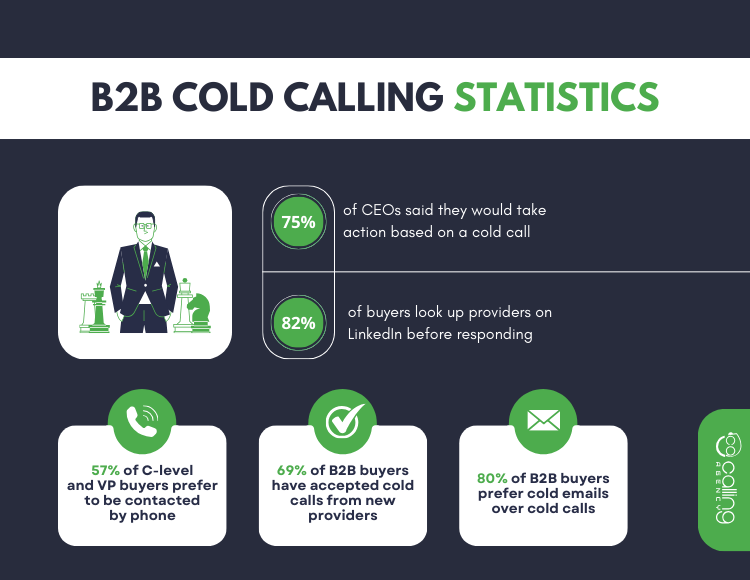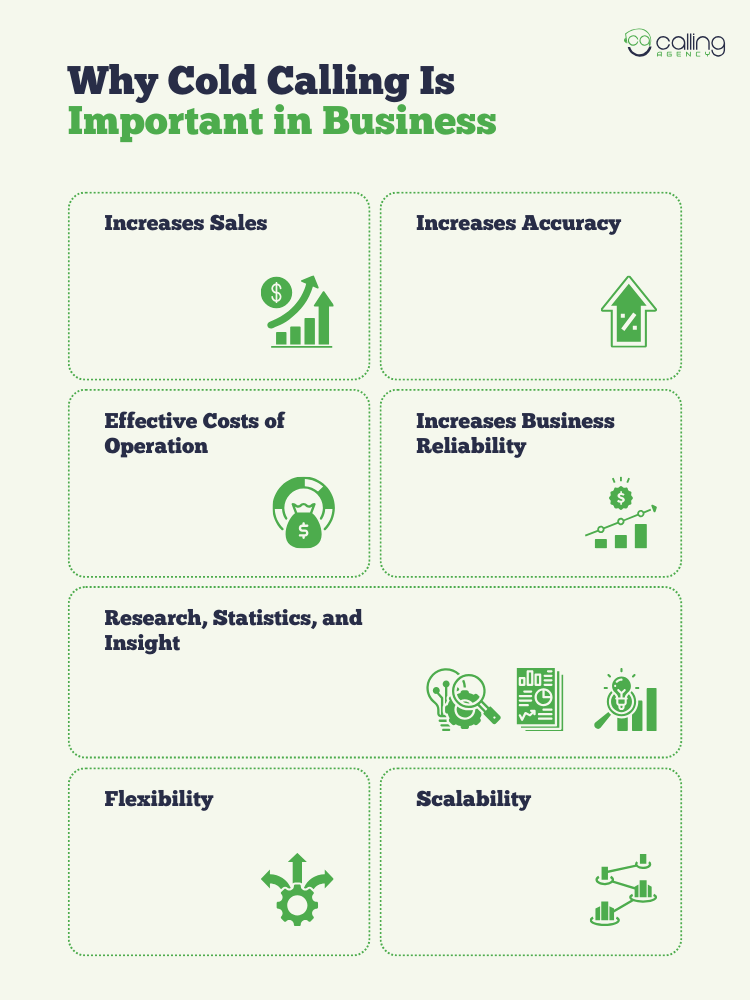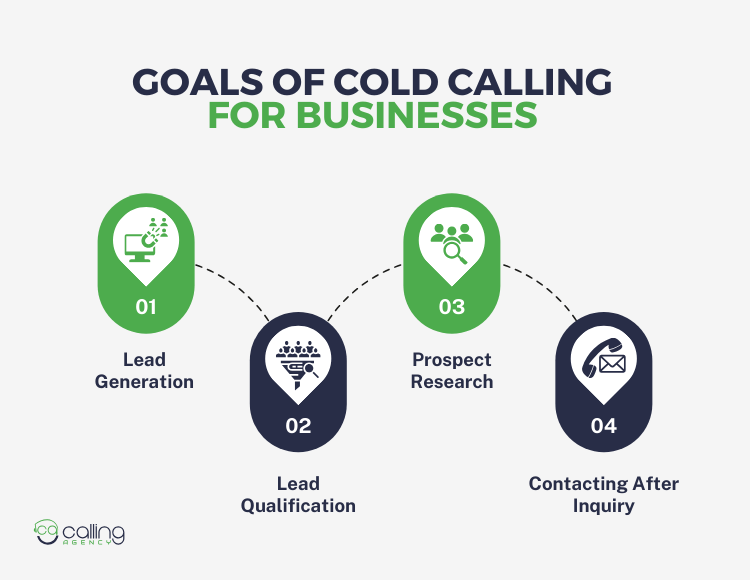Cold calling is still essential in business just because of its scope of direct communication. Nowadays, digital marketing strategies often take center stage in business. However, the importance of cold calling is still unwavering.
Despite the evolving marketing methodologies, businesses find value in the direct and personal approach. Notably, the cold calling offers this. It’s not merely a relic of traditional outreach. Instead of it, it’s a powerful tool that can unlock numerous opportunities for growth and success.
According to Dooly, CEOs stated that they would respond to a cold call in 75% of cases.

In this blog, we’ll delve into the core reasons why cold calling continues to be a vital component in the business. We also explore its impact on sales, operational efficiency, and overall business reliability.
So, let’s jump into the deep.
7 Reasons Why Is Cold Calling Important in Business
With the advanced and new digital marketing strategies, cold calling is still essential for a business. Even cold calling services help to grow a business in various ways. Here are some reasons why cold calling is important for a business.
1. Increases Sales
Making cold calls can be an effective tool for increased sales. Through direct, personable engagement, businesses can articulate their value propositions directly to potential clients, fostering meaningful connections.
This interactive approach allows for real-time adaptation to objections and the precise addressing of individual needs. The motivation behind cold calling lies in its potential to sway purchasing decisions. Cold calling also offers a personalized touch that transcends digital interactions and helps to increase sales.
In the competitive market, this proactive strategy ensures businesses identify opportunities and actively create them, making cold calling an indispensable tool for maximizing reach and influencing sales strategy.
2. Increases Accuracy
Cold calling becomes a strategic precision tool in the business. It helps to enhance accuracy in targeting and communication. Businesses can fine-tune their outreach efforts by directly engaging with potential clients. This ensures a focused approach to individuals genuinely interested in their offerings.
This systematic strategy enables sales teams to implement expert approaches. They can make their communication based on specific needs and pain points. This approach also helps to collect quality sales leads.
B2B Cold calling services have broad significance in the B2B business. It allows for the identification of key decision-makers and the presentation of specific solutions. Using outbound cold-calling services increases accuracy and ensures every outreach aligns with business goals. When accuracy is critical, cold calling becomes a dependable way of achieving focused and efficient communication.

3. Effective Costs of Operation
Cold calling stands out as a cost-effective operational strategy for businesses. Cold calling requires minimal financial investment while offering substantial returns. Businesses can streamline their marketing budget by directly reaching out to potential clients. They can focus resources on personalized communication rather than extensive advertising.
This targeted approach reduces overall operational costs and ensures that resources are allocated efficiently. Cold calling’s cost-effectiveness is particularly advantageous for startups and businesses. It provides them with a direct and economical means to connect with their audience. It also helps to establish relationships and drive business growth.
4. Increases Business Reliability
Cold calling plays a pivotal role in bolstering the reliability of a business in the eyes of potential clients. With improved cold calling skills, direct communication fosters a sense of trust and credibility, as businesses can address inquiries and concerns in real time.
This proactive engagement of a cold caller demonstrates a commitment to customer satisfaction. It establishes a reliable image, which is essential for a business.
Through cold calling, businesses can also convey their expertise, showcase industry knowledge, and assure clients of their dedication to meeting individual needs. For a business, successful business relationships and the reliability instilled by cold calling become critical differentiators. It also significantly helps businesses stand out in a competitive market.
5. Research, Statistics, and Insight
For organizations, cold calling is a great way to obtain data, research, and valuable insights. Direct interactions with potential clients provide real-time feedback. It also allows businesses to understand market needs and preferences.
Through conversations, sales teams can gather qualitative data, uncover pain points, and identify emerging trends. This firsthand information becomes a goldmine for refining marketing strategies and making offerings to match consumer demands.
In data-driven decision-making, cold calling emerges not just as a communication tool but as a source of invaluable insights. It makes it possible for businesses to remain ahead of the curve, flexible, and responsive in a changing market.
6. Flexibility
Cold calling introduces a crucial element of flexibility into the business outreach strategy. Cold calling enables companies to modify and customize their message at any time. You can’t find this opportunity in structured marketing programs. So, this dynamic approach is particularly beneficial in addressing diverse audience needs. For a business, it’s very beneficial.
Sales representatives can pivot their communication based on the prospect’s response. They can make real-time adjustments to better resonate with individual concerns. Flexibility in cold calling also extends to the timing and frequency of outreach. This helps to enable businesses to align their efforts with peak engagement periods.
In the competitive market for a business, the adaptability offered by cold calling proves instrumental in maintaining relevance and responsiveness.
7. Scalability
Cold calling emerges as a scalable strategy. It is capable of accommodating the evolving needs and growth of a business. Geographical limits open to more than confirm this approach. It allows businesses to extend their reach across diverse markets.
As the volume of potential clients expands, cold calling can smoothly scale to match the demand. Automation tools further enhance scalability. It also enables efficient management of more extensive outreach efforts. Whether reaching out to new demographics or expanding product lines, cold calling provides a versatile platform that grows in tandem with the business.
Moreover, the scalability of cold calling ensures that businesses can pursue growth opportunities with confidence and efficiency.
Goals of Cold Calling for Businesses
Cold calling serves multiple strategic objectives for businesses. It provides a versatile tool for direct engagement and relationship-building. The key goals are:

Lead Generation
Cold calling is a vital method for generating leads. Businesses can identify individuals or organizations interested in their products or services by initiating direct contact with potential clients. This proactive approach ensures a steady influx of prospects into the sales pipeline.
Lead Qualification
Beyond generating leads, cold calling also allows for the qualification of those leads. Through meaningful conversations, businesses can assess the level of interest, address specific needs, and determine the likelihood of conversion. This process ensures that sales efforts are focused on high-potential prospects.
Prospect Research
Cold calling serves as a valuable tool for prospect research. Direct interactions provide insights into the challenges, preferences, and pain points of potential clients. This information enhances the business’s understanding of its target audience. Besides, it enables more personalized and effective communication.
Contacting After Inquiry
Cold calling plays a crucial role in following up with potential clients who have expressed initial interest or made inquiries. This proactive outreach ensures businesses remain engaged with prospects, providing timely information and addressing any concerns, ultimately moving them further along the sales funnel.
Conclusion
Cold calling services emerge as an indispensable force in the dynamic business competition. Its ability to increase sales, enhance accuracy, and provide cost-effective operations underscores its relevance in contemporary marketing strategies.
The reliability it instills, coupled with the wealth of research and insights it gathers, positions cold calling as a vital tool for businesses navigating competitive markets. The flexibility and scalability it offers further amplify its impact.
As businesses seek direct, personalized engagement to increase connections and drive growth, cold calling remains a steadfast ally. It proves that in the time of advanced digital marketing, the human touch of a phone call holds enduring power in building lasting business relationships.








